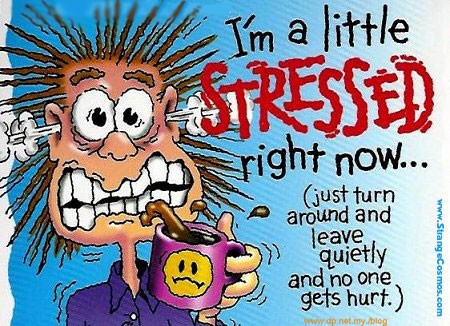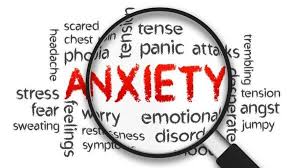Our Folded Hands
Women helping Women. Reaching out to the Sister who still suffers. Helping each other through the Good times and the Difficult times. To get to the SOBER way of life, One Day at a Time.

---Learn your triggers---
-The kids are screaming, the bills are due and the pile of papers on your desk is growing at an alarming pace. It’s undeniable — life is full of stress that can turn into heart-stopping anxiety in a second . Understanding the types and sources of stress — short term and long term, internal and external — is an important part of stress management. So what stresses you out?
Main types of stress
–Stress is your body’s reaction to the demands of the world. Stressors are events or conditions in your surroundings that may trigger stress. Your body responds to stressors differently depending on whether the stressor is new or short term — acute stress — or whether the stressor has been around for a longer time — chronic stress.
Acute stress
–Also known as the fight-or-flight response, acute stress is your body’s immediate reaction to a perceived threat, challenge or scare. The acute-stress response is immediate and intense, and in certain circumstances it can be thrilling. Examples of acute stressors include having a job interview or getting a speeding ticket.
–A single episode of acute stress generally doesn’t cause problems for healthy people. However, severe acute stress can cause mental health problems — such as post-traumatic stress disorder. It can also cause physical difficulties such as tension headaches, stomach problems or serious health issues — such as a heart attack.
–Chronic stress
Mild acute stress can actually be beneficial — it can spur you into action, motivate and energize you. The problem occurs when stressors pile up and stick around. This persistent stress can lead to health problems, such as headaches and insomnia. The chronic-stress response is more subtle than is the acute-stress response, but the effects may be longer lasting and more problematic.
***Effective stress management involves identifying and managing both acute and chronic stress.
Know your stressors
Effective stress management starts with identifying your sources of stress and developing strategies to manage them.
*One way to do this is to make a list of the situations, concerns or challenges that trigger your stress response. Take a moment to write down some of the top issues you’re facing right now. You’ll notice that some of your stressors are events that happen to you while others seem to originate from within.
External exasperations
External stressors are events and situations that happen to you. Some examples of external stressors include:
Major life changes. These changes can be positive, such as a new marriage, a planned pregnancy, a promotion or a new house. Or they can be negative, such as the death of a loved one or a divorce.
Environment. The input from the world around us can be a source of stress. Consider how you react to sudden noises, such as a barking dog, or how you react to a bright sunlit room or a dark room.
Unpredictable events. Out of the blue, uninvited house guests arrive. Or you discover your rent has gone up or that your pay has been cut.
Workplace. Common stressors at work include an impossible workload, endless emails, urgent deadlines and a demanding boss.
Social. Meeting new people can be stressful. Just think about going on a blind date, and you probably start to sweat. Relationships with family often spawn stress as well. Just think back to your last fight with your partner or child.
Strategies to manage external stressors include lifestyle factors such as eating a healthy diet, being physically active and getting enough sleep — which help boost your resiliency. Other helpful steps include asking for help from others, using humor, learning to be assertive, and practicing problem-solving and time management. Consider how you use your time and energy by focusing on activities that are important to you, paring down the number of activities you’re involved in, and saying no to new commitments.
Internal irritations
Not all stress stems from things that happen to you. Much of our stress response is self-induced. Those feelings and thoughts that pop into your head and cause you unrest are known as internal stressors. Examples of internal stressors include:
Fears. Common ones include fear of failure, fear of public speaking and fear of flying.
Uncertainty and lack of control. Few people enjoy not knowing or not being able to control what might happen. Think about how you might react when waiting for the results of a medical test.
Beliefs. These might be attitudes, opinions or expectations. You may not even think about how your beliefs shape your experience, but these preset thoughts often set us up for stress. Consider the expectations you put on yourself to create a perfect holiday celebration or advance up the career ladder.
The good news is that we have the ability to control our thoughts. The bad news is that our fears, attitudes and expectations have been our companions for a long time and it often takes some effort to change them. Strategies to manage internal stressors include reframing your thoughts and choosing a positive mindset, challenging negative thoughts, using relaxation techniques, and talking with a trusted friend or counselor.
Take the first step
Recognizing a problem is the first step toward solving it. By beginning to identify and understand the sources of your stress, you’ve taken the first step in learning to better manage it. Manage it, not eliminate it. Stress is a fact of life. And that’s OK. You can learn ways to handle it.

Stress symptoms: Effects on your body and behavior
Stress symptoms may be affecting your health, even though you might not realize it. You may think illness is to blame for that irritating headache, your frequent insomnia or your decreased productivity at work. But stress may actually be the cause.
Common effects of stress
Indeed, stress symptoms can affect your body, your thoughts and feelings, and your behavior. Being able to recognize common stress symptoms can help you manage them. Stress that’s left unchecked can contribute to many health problems, such as high blood pressure, heart disease, obesity and diabetes.
Common effects of stress On your body On your mood On your behavior
Headache Anxiety Overeating or undereating
Muscle tension or pain Restlessness Angry outbursts
Chest pain Lack of motivation or focus Drug or alcohol misuse
Fatigue Feeling overwhelmed Tobacco use
Change in sex drive Irritability or anger Social withdrawal
Stomach upset Sadness or depression Exercising less often
Sleep problems
Act to manage stress
If you have stress symptoms, taking steps to manage your stress can have many health benefits. Explore stress management strategies, such as:
Getting regular physical activity
Practicing relaxation techniques, such as deep breathing, meditation, yoga, tai chi or massage
Keeping a sense of humor
Spending time with family and friends
Setting aside time for hobbies, such as reading a book or listening to music
Aim to find active ways to manage your stress. Inactive ways to manage stress — such as watching television, surfing the internet or playing video games — may seem relaxing, but they may increase your stress over the long term.
And be sure to get plenty of sleep and eat a healthy, balanced diet. Avoid tobacco use, excess caffeine and alcohol, and the use of illegal substances.
When to seek help…
If you’re not sure if stress is the cause or if you’ve taken steps to control your stress but your symptoms continue, see your doctor. Your healthcare provider may want to check for other potential causes. Or consider seeing a professional counselor or therapist, who can help you identify sources of your stress and learn new coping tools.
Also, get emergency help immediately if you have chest pain, especially if you also have shortness of breath, jaw or back pain, pain radiating into your shoulder and arm, sweating, dizziness, or nausea. These may be warning signs of a heart attack and not simply stress symptoms.

To Manage Anxiety, Start with the Way You Think!
Fear is largely caused by your thoughts. Changing the way you think about something can help calm your fear reaction and reduce anxiety.
Imagine a situation that makes you nervous. Maybe it’s getting on a plane or giving a presentation to colleagues.
Your pulse quickens. Your face flushes. Your breath speeds up and becomes uneven as adrenaline pumps through your veins.
For some, the fear and anxiety becomes strong enough that they avoid the situation. Avoidance, however, affects how you live by limiting how you engage life.
By practicing a few techniques, you can learn how fear affects your body and how you can control your stress response.
Listen to your body to change your emotions
Fear has a physical response — rapid heart rate, quicker breaths and other physiological responses. Stressful situations produce these physical responses, which your mind interprets as, “You are afraid.”
When you physically feel fear, take a moment to listen to your body and gain back control. Are you breathing quickly or hard? Take a few deep breaths and slow your breathing.
Controlling your physical response to fear can influence your emotional response.
Get past your own thoughts
Fear is largely caused by your thoughts. Your body gives you a fear stimulus and your mind takes off, giving you all kinds of irrational reasons you should be scared.
Of course the reasons aren’t always logical — you aren’t going to make a complete fool of yourself if you have to make a speech — but these irrational thoughts fill your mind and intensify your fear.
Don’t believe them!
Instead, identify those thoughts that are causing you fear. Challenge them. What evidence is there you’ll make a complete fool of yourself? None. You might not receive a standing ovation, but that is OK, your goal is to give a professional presentation where your audience can learn from you. Reappraise the situation and distance yourself from overly critical thoughts.
How you think about a circumstance impacts how you feel about it. Approaching your fear rationally, realistically and changing how you think will help you overcome its strong irrational stimuli.
Use your imagination to lessen your fears
As vividly as you can, imagine a situation that causes you fear. Feel your anxiety grow, but then add new information. Ask yourself, what are you worried about? What are the likeliest outcomes? Then imagine what you want to happen.
Adding new information and associations to your fears will help lessen their effects when you feel them in real life. This can be challenging to accomplish without professional guidance, so if needed, see a licensed mental health professional with expertise in anxiety management.

Stress & Anxiety Symptoms...
Fear and Panic
Knowing that it’s “an emotional thing” doesn’t help much when I’m going through the anxiety and the terror and the fear in me, wondering if it will ever go away.
I listen to the radio mornings while I’m getting breakfast and I hear all of this bad news. I don’t like it. It’s too much. Too sad, too violent. Not my thing.
All I can say is I’m glad these things don’t happen around me. Then people would really be sorry.
I mean, the other day I had a dentist appointment. I was scared and jittery and I’d thought about calling the whole thing off. Of course my dentist is a man. He could have started right in, slipping his hand along my legs, up around my thighs and that would have been that.
—And Saturday I had to go shopping. Needed some shampoo and conditioner and things like that. I was sixth on line and there was only one cashier so it was taking forever. I felt the sweat build up then drip down my face in little droplets but I don’t think anyone noticed.
The skinny lady ahead of me turned sideways once but I think that was to see the price on these furry little doggies hanging down that the store was trying to get rid of fast. I don’t think she was too impressed because it didn’t take her long to read the tag and turn forward again. To wait, bored, wait her turn.
Meantime I kept shifting from foot to foot and back again but so did everyone else so I felt like part of the crowd.
As I kept hopping around I kept praying that no one ahead of me would get grumpy and start a fight with the cashier because, slow as she was, it was one of my days and I would have burst right out crying. I can’t help it. People say “stop it” and they think that’s so easy to do but it ain’t. Just being around people fighting and cussin’ gets me going and once that starts there’s no telling what’ll happen next. It’s what I call unpredictable.
It’s one of those emotional problems, that’s what they call it. All I know is when things are calm, I’m okay. But once people get to fussing, it touches off something inside — sort of a frightened part — and I get hysterical.
Like the time a friend and I were playing some music. Things were good — we had raided the refrigerator and gotten pretzels and Diet Cokes and everything we wanted when all of a sudden her parents burst in the front door yelling at the top of their lungs. It was a fight between them, I knew that, but that didn’t stop the upset that started rising.
I tried telling myself that it was nothing, that it wasn’t my fault or hers but sure enough I felt the lump in my throat grow bigger and bigger and lodge itself right smack where I didn’t want it. My hands grew clammy and I got up and walked around.
She could tell that something was going on, something was definitely brewing. She asked, “What’s up?” but when I tried to respond the words just didn’t come out right. Sounded like I was talking backwards.
Meantime they kept at it and I got frantic. Did they always f’en talk this way? They glanced over at us girls and I thought they knew something was wrong, thought they could tell I wasn’t right, but I guess since I didn’t show any outward sign, they couldn’t tell. They weren’t perceptive.
They just kept going so my friend called them to come quick and then — then — they knew that something was up so they stopped yelling at each other’s foolishness and insanity and concentrated on me and kept holding my hands asking what was wrong. I couldn’t even begin to explain.
After a while of no yelling and peace and quiet, I came back to reality. I calmed down. My distress sure scared the hell out of them and out of me. Knowing that it’s “an emotional thing” doesn’t help much when I’m going through the anxiety and the terror and the fear in me, wondering if it will ever go away. Then wondering if this thing is a keeper. I don’t want it to be a keeper. Go away, I say to myself and sometimes out loud. Go away and don’t come back again. It’s a nice sentiment but the reality is that the peace, quiet, and calm don’t last. They never do.
Last year and the year before that I thought drinking some beers would help the anxiety — so I drank myself senseless — but the beers didn’t help at all. The high just made me feel paranoid and during the lows I’d feel even more depressed than before I started drinking. So that was that. No more beers, I said to myself. It was a horror giving it up and going through the feelings. Going through the terror.
Will this always be with me?
Will “e” always mean “emotional” to me or will there come a time when, someday down the road, when I’m all grown up and working and thinking of other things, will the letter “e” represent anything else to me other than emotional? Will I maybe think of “enterprising” or “entrepreneurial” or even “evergreen”?
Perhaps, but I doubt it. I think that my first thought will be “emotional.” And if you say “what’s an ‘a’ word,” I’ll always say “alcohol.” Hey, it’s the hand I was dealt. It’s the genes I got or maybe, just maybe I was conditioned to be fine-tuned. Sensitive is what some people call it.
Some people react so strangely when they find out what’s wrong. They think it’s either imagined or it isn’t that bad. So they smile or wave or talk condescendingly to me. They use simple words and they try to placate me, and when the waves of panic are still riding over me I look at them like they’re crazy. Can’t they even imagine what sheer terror is like?
In front of my friends parents my anxiety passed eventually. It rode its course. I breathed again, normally, and the clamminess began to subside. They still looked at me funny, like her friend here is a bit of an oddball but I looked at them funny, too, because why would they walk into their home yelling and screaming like some fucking idiots? Besides, I know what’s wrong with me. It’s emotional.
Sometimes I think that the world is nice and sometimes I wonder what it’s all about. I can’t take it when people scream, as I already told you, or when pans crash to the floor. Or when a balloon bursts. When several balloons burst at the same time it’s not good. Not good at all.
I hate it when we’re driving along nice and smooth and someone gets too close to our car and we hit the brakes hard, hard, hard; the screech of the tires on the road just gets right under my skin.
Backed up lines on parkways? Traffic stopped on New York bridges? Especially when we’re at the highest point on the bridge — no longer going up and not yet heading down? That damn pinnacle is not my favorite place to be.
I imagine all of us dangling over the side of that metal bridge with each one of us holding on with one hand, holding on for dear life and that sweat breaks out once again as I concentrate so hard to hold on and wait, wait, wait for someone to come along and rescue us. And I know it’s my overactive imagination at work, but why do the pictures it paints have to be so damned vivid?
Walking along from one house to another when suddenly a lawn mower starts up so loudly I jump and cover my ears. Talk about breaking the sound barrier. That’s how it seems to me, anyway. I freeze in my tracks but then realize I’m not getting anywhere at all so I carry on, wondering why it is that a silent lawn mower can’t be made or at least a lawn mower that’s nice and quiet? That would be good. That shouldn’t be too hard to invent.
I like the Fourth of July because everything looks so pretty with the sky all lit up like that with the pyrotechnics going off in various designs but I get so scared when a cherry bomb or something goes off next door. I just have to cry. I can’t help it.
Noises aren’t the only things. Flashing lights set me off, too, like the time we had a school dance on a Friday night and someone hit the ceiling lights and suddenly those strobe lights were flashing, flashing, flashing and I know those disco lights were meant to add a certain ambiance to the party but my head started spinning and I had to just get out of there. Fast.
It’s a weird thing. But the good times are good times. I like looking at flowers out in the backyard so closely, I want to squint to see every inch of them. Velvet they feel like.
I love running around with my dog Penny, spinning and twirling and feeling the grass cool beneath my feet while an airplane flies gently overhead. You could call that one of my good days. It’s peace, quiet, and feeling comfortable. I call it progress. I’ll take it.
I guess for once I feel I’m as free as the birds I see gliding overhead and I know there’s nothing to cry over and nothing to be afraid of anymore…

How to be happy: Tips for cultivating contentment
Are you tired of waiting around for happiness to find you? Stop waiting and start getting happy with these tips.
Do you know how to be happy? Or are you waiting for happiness to find you?
Despite what the fairy tales depict, happiness doesn’t appear by magic. It’s not even something that happens to you. It’s something you can cultivate.
So, what are you waiting for? Start discovering how to be happy.
How to be happy: What science tells us
Only a small percentage of the variation in people’s reports of happiness can be explained by differences in their circumstances. It appears that the bulk of what determines happiness is due to personality and — more importantly — thoughts and behaviors that can be changed.
So, yes, you can learn how to be happy — or at least happier.
Although you may have thought, as many people do, that happiness comes from being born rich or beautiful or living a stress-free life, the reality is that people who have wealth, beauty or less stress are not happier on average than those who don’t enjoy those things.
People who are happy seem to intuitively know that their happiness is the sum of their life choices, and their lives are built on the following pillars:
Devoting time to family and friends
Appreciating what they have
Maintaining an optimistic outlook
Feeling a sense of purpose
Living in the moment
How to be happy: Practice, practice, practice
If you’ve been looking for happiness, the good news is that your choices, thoughts and actions can influence your level of happiness. It’s not as easy as flipping a switch, but you can turn up your happiness level. Here’s how to get started on the path to creating a happier you.
Invest in relationships
Surround yourself with happy people. Being around people who are content buoys your own mood. And by being happy yourself, you give something back to those around you.
Friends and family help you celebrate life’s successes and support you in difficult times. Although it’s easy to take friends and family for granted, these relationships need nurturing.
Build up your emotional account with kind words and actions. Be careful and gracious with critique. Let people know that you appreciate what they do for you or even just that you’re glad they’re part of your life.
Express gratitude
Gratitude is more than saying thank you. It’s a sense of wonder, appreciation and, yes, thankfulness for life. It’s easy to go through life without recognizing your good fortune. Often, it takes a serious illness or other tragic event to jolt people into appreciating the good things in their lives. Don’t wait for something like that to happen to you.
Make a commitment to practice gratitude. Each day identify at least one thing that enriches your life. When you find yourself thinking an ungrateful thought, try substituting a grateful one. For example, replace “My sister forgot my birthday” with “My sister has always been there for me in tough times.”
Let gratitude be the last thought before you go to sleep. Let gratitude also be your first thought when you wake up in the morning.
Cultivate optimism
Develop the habit of seeing the positive side of things. You needn’t become overly optimistic — after all, bad things do happen. It would be silly to pretend otherwise. But you don’t have to let the negatives color your whole outlook on life. Remember that what is right about you almost always trumps what is wrong.
If you’re not an optimistic person by nature, it may take time for you to change your pessimistic thinking. Start by recognizing negative thoughts as you have them. Then take a step back and ask yourself these key questions:
Is the situation really as bad as I think?
Is there another way to look at the situation?
What can I learn from this experience that I can use in the future?
Find your purpose
People who strive to meet a goal or fulfill a mission — whether it’s growing a garden, caring for children or finding one’s spirituality — are happier than those who don’t have such aspirations.
Having a goal provides a sense of purpose, bolsters self-esteem and brings people together. What your goal is doesn’t matter as much as whether the process of working toward it is meaningful to you.
Try to align your daily activities with the long-term meaning and purpose of your life. Research studies suggest that relationships provide the strongest meaning and purpose to your life. So cultivate meaningful relationships.
Are you engaged in something you love? If not, ask yourself these questions to discover how you can find your purpose:
What excites and energizes me?
What are my proudest achievements?
How do I want others to remember me?
Live in the moment
Don’t postpone joy waiting for a day when your life is less busy or less stressful. That day may never come.
Instead, look for opportunities to savor the small pleasures of everyday life. Focus on the positives in the present moment, instead of dwelling on the past or worrying about the future